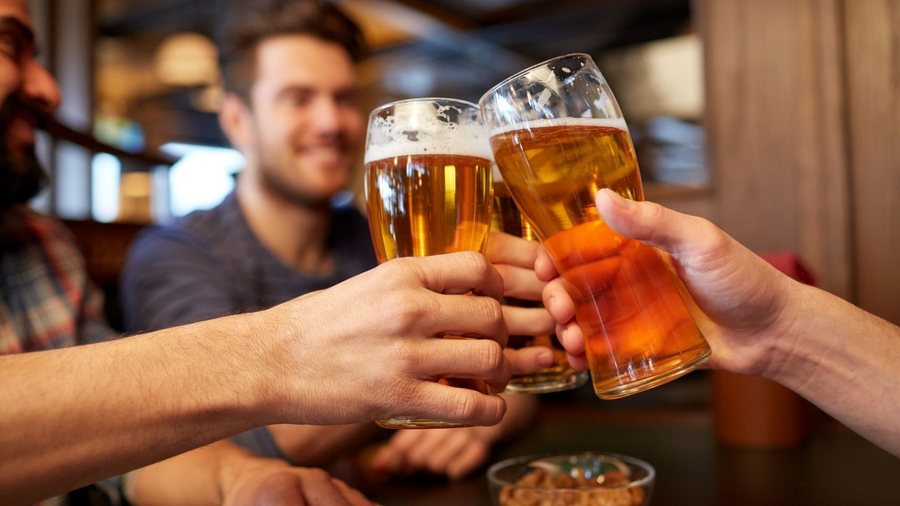Why are Trump's trade wars threatening already vulnerable beer producers?!

American brewers already have enough problems. But now there's a new threat: President Donald Trump's tariffs, including 25% taxes on imported steel and aluminum and on goods from Canada and Mexico. "It's going to cost the industry a significant amount of money ," said Matt Cole, director of brewing at Ohio-based Fat Head Brewery.
The tariffs, some of which have been suspended until April 2, could affect brewers in ways big and small, said Bart Watson. Watson is the president and CEO of the Brewers Association, the trade group for craft beer.
Aluminum cans are a Trump issue. And nearly all the steel barrels used by U.S. brewers are made in Germany, so a tariff on finished steel products would increase the cost of barrels. Tariffs on Canadian products like barley and malt would also increase costs. And some brewers depend on raspberries and other fruits from Mexico, Watson said.
At Port City Brewing in Alexandria, Virginia, founder Bill Butcher worries that he will have to raise the price of a six-pack of Optimal Wit and other best-selling beers to $18.99 (17.55 euros) from about $12.99 (12.01 euros) and charge more for a pint in his tasting room. " Will people still come here and pay $12 for a pint instead of $8? " he said. "Our business will slow down."
For Port City, the biggest threat comes from the looming tariff on Canadian imports. Every three weeks, the brewery receives a 40,000-pound truckload of pilsner malt from Canada, which goes into a 55,000-pound silo on the brewery grounds. Butcher said he can't find malt of comparable quality anywhere else.
Trump's tariffs also hit Port City in a roundabout way. The aluminum tax, which went into effect March 12, is causing major brewers to switch from aluminum cans to bottles. Port City, which makes 70% of its beer, found itself unable to get bottles. " Our bottle supplier is going to cut us off at the end of the month ," Butcher said. "It caught us off guard."
Fat Head Brewery sources its barley from Canada. Cole said it could shift to sources in Idaho and Montana, but the logistics of shipping are more complicated. And Trump's tariffs, by putting Canadian barley at a competitive disadvantage, would allow U.S. producers to raise domestic prices.
Fat Head's is trying to cushion the impact of the tariffs. Anticipating higher aluminum prices, for example, the brewery stockpiled beer cans it gets from a U.S. supplier and now has 3 million cans in its warehouse, 30% of what it needs each year. It has also shifted production to painted cans, which are cheaper than those with film sleeves.
In Arizona, some brewers are already eliminating or reducing the beers they offer in aluminum cans to cut costs, said Cale Aylsworth, director of sales and relations at OHSO Brewery and Distillery and president of the Arizona Craft Brewers Guild. " This is a blow to Arizona craft. I hate to see fewer local options on the shelf," Aylsworth said.
Some brewers have also lost access to store shelves from a major customer: Canada, which is the top foreign market for American craft beer, accounting for nearly 38% of exports. But Canadians are angry that Trump targeted their products, and Canadian importers have canceled orders and pulled American beer from store shelves.
Changing consumer tastes
The tariffs come at an already difficult time for brewers. After years of steady growth, the number of breweries in the U.S. doubled to 9,736 between 2014 and 2024, as the industry struggles to compete with seltzers and other beverages and win over younger customers. In 2024, brewery closures outnumbered openings for the first time since the mid-2000s, said Watson of the Brewers Association. He estimates that U.S. beer production fell 2% to 3% last year.
“Craft beer had a phenomenal growth period, but we’re not in that era anymore, ” he said. “ We’re in a more mature market. ” Port City’s production peaked in 2019 at 16,000 barrels of beer equivalent to 220,000 cases. Then the pandemic hit, hitting the company’s bar and restaurant brewing business. The recovery has been slow. Butcher expects Port City to produce 13,000 barrels this year.
The brewery seeks to set itself apart by highlighting its award-winning brews. In 2015, Port City was named Small Brewery of the Year at the Great American Beer Festival. But it’s not easy with import taxes threatening to increase the cost of ingredients and packaging.
"It's hard enough to run a small business when your supply chain is intact, " he said. And the erratic way Trump has imposed tariffs—announcing them, then suspending them, then threatening new ones—has made planning even harder. "The unpredictability just injects an element of chaos," Butcher said.
Aylsworth, in Arizona, said large brewers have entire teams of people calculating the impact of tariffs, but smaller brewers are having to stretch their resources to navigate them. That's on top of the other complexities of running a brewery, from zoning laws to licensing permits to labor shortages.
But for many brewers, the biggest burden now is lower sales as customers cut back on beer, Aylsworth said. That's why many brewers are trying hard not to raise prices. " In today's world, with the economy and the high level of uncertainty, people are spending less," Cole said. "Beer is an affordable luxury and we want to make sure we don't lose that."

EU to fine Apple and Meta - Commission decisions risk escalating tensions with the US
The European Commission is expected to fine Apple and Meta this week for violating EU digital competition rules, drawing the big companies into the trade war......

DPT: April 1st deadline for submitting DIVA 2024 and Profit Tax Declaration
As announced on the Tax Administration's social media, tomorrow, April 1, 2025, is the deadline for submitting DIVA 2024. The same deadline, April 1, 2025,......

Police salaries in Europe: Which countries pay officers the most and the least?
Police play a vital role in maintaining public order and ensuring the safety of citizens. To support these essential services, European governments allocate......

How could the European Central Bank react to Trump's trade tariffs?!
The European Central Bank (ECB) is bracing for renewed economic uncertainty as U.S. President Donald Trump prepares to impose a wide range of tariffs. On......

Insurance companies pay 1.2 billion lek in damages - AMF: About 1.28% less than in 2023. Most of it belongs to motor insurance
Claims paid by insurance companies have decreased. Around 1.2 billion lek is the amount of claims paid by insurance companies in January-February of this......

"VAT will be reduced to 15%" - Sali Berisha presents the "Made in Albania" program in detail
The leader of the Democratic Party, Sali Berisha, has presented in detail the "Made in Albania" program, which aims to promote production in Albania.......

Higher Education, 1 billion lek collected in 2024 - Instat: The number of registrations has decreased by 14% in 4 years
Even with a decrease in the number of students in the auditoriums of Albanian universities, data from the Ministry of Finance shows that during the past......

38 million euros for the purchase of energy - In the period January-March KESH conducts 10 tenders
3 tender procedures are carried out, the bill is estimated at around 11 million euros Around 38 million euros were spent in the first 3 months of the year......


















